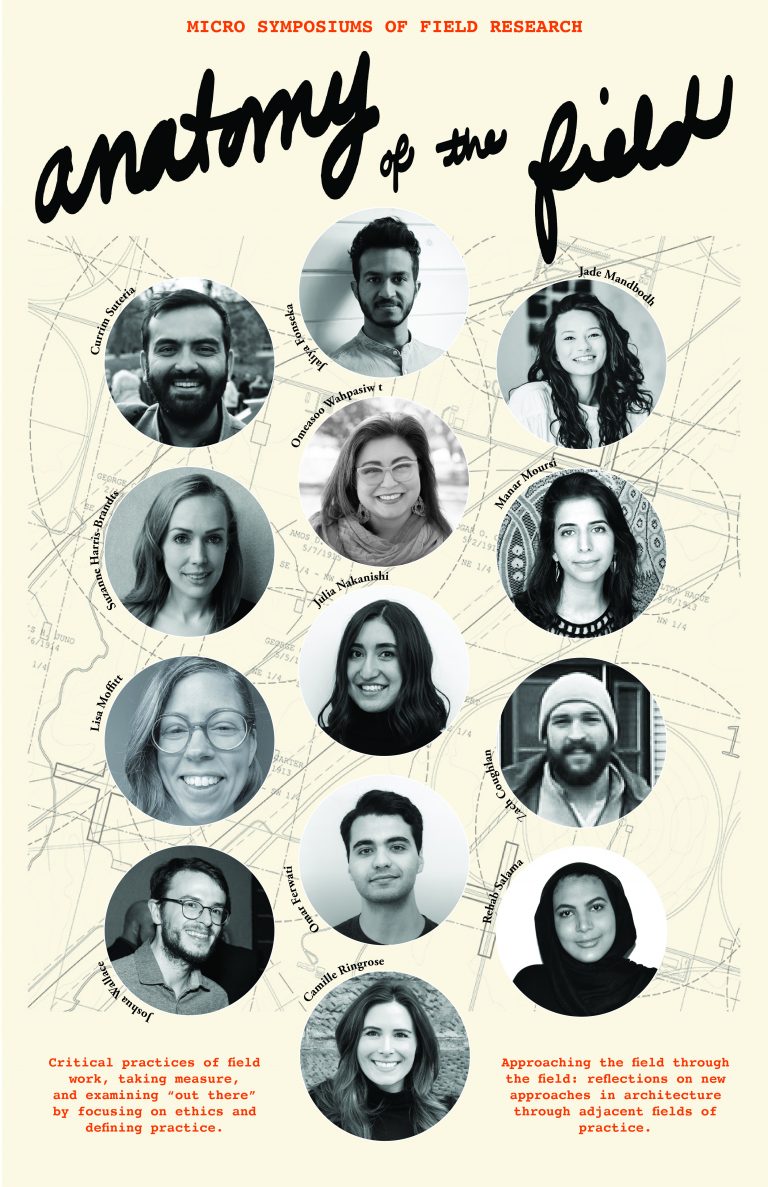New Graduate Seminar and Micro-Symposiums Celebrate Field Research Methods
November 22, 2021
Anatomy of the Field – Graduate Seminar
Micro-Symposiums Celebrating Field Research Methods and Reflecting on Ethics of Practice

This semester, Assistant Professor Piper Bernbaum is teaching a new course as a graduate-level seminar. It is called Anatomy of the Field: Critical practices of field work, taking measure, and examining “out there.”
The course seeks to evaluate the role of field work within architectural practice and research to find new values in positioning critical practice through different lenses. Understanding that field work is a part of many professions, Anatomy of the Field focuses on the tools and methods used in various disciplines. They include anthropology, sociology, ecology, engineering, biology, archaeology, forensics, geography, and psychogeography, questioning the “field” that is being studied and the “field” through which we are thinking and framing architectural work.
With a focus on spending time on location, students recalibrate the value of a site by taking measure and acknowledging the varying conditions of its environment that can teach us to expand our practice.
The course focuses on working empathetically by studying examples of qualitative and quantitative analysis, seeking out everyday phenomena, and making students step outside of architecture. The course is looking to re-write our ways of working and thinking by making hybrid tools of measure and intervention.
In conjunction with the course lectures and ongoing student field work, Bernbaum organized a series of micro-symposiums with invited guests to reflect on their own practices in the field and the ethics of their methods.
The guests were organized by module theme and brought various studies of diverse contexts to the discussion. The presentations spoke to reflections on their practice, offered advice to future field workers, and culminated in a group discussion.
The goals of these symposiums were:
– to encourage better practices in architecture;
– more empathy and respect when defining our working methods;
– innovative thinking and working methods; and
– continued practice of respect when studying histories of sites and communities, as well as the everyday experiences of our contexts.
Although guests were organized by module and discipline, most guests’ work spans many disciplines and takes on many considerations of site, community, and context. The micro-symposiums were a wonderful addition to the course. Bernbaum, along with the students, are grateful for the opportunity to speak with and learn from so many amazing researchers and to celebrate their work.
Here are the modules and guests:
Module 01: Anthropology + Sociology + Ethnography
Rehab Salama (Anthropology and Theology, Cairo)
Dr. Suzanne Harris-Brandts (Anthropology and Sociology, Georgia)
Jaliya Fonseka (Anthropology and Human Geography, Sri Lanka)
Currim Suteria (Sociology and Storytelling, Pakistan)
Zac Coughlan (Historical Anthropology, Newfoundland)
Module 02: Forensics + Geography + Psychogeography + Archaeology
Omar Ferwati (Forensic Architecture, Syria and Lebanon)
Manar Moursi (Psychogeography, Geography, Egypt)
Jade Manbodh (Archaeology, Geography, Cambridge)
Dr. Omeasoo Wahpasiw (Human Geography, Indigenous Spatial Heritage)
Module 03: Biology + Ecology + Engineering + Landscapes
Dr. Lisa Moffitt (Ecology/Engineering/Biology, Environmental Systems)
Julia Nakanishi (Landscapes/Ecology/Anthropology, Japan)
Camille Ringrose (Ecology/Biology, Scotland Moors)
Joshua Wallace (Engineering/Landscapes, Athabasca Glaciers)

If any students are interested in the content of these lectures or the course, please feel free to contact Prof. Bernbaum at piper.bernbaum@carleton.ca.